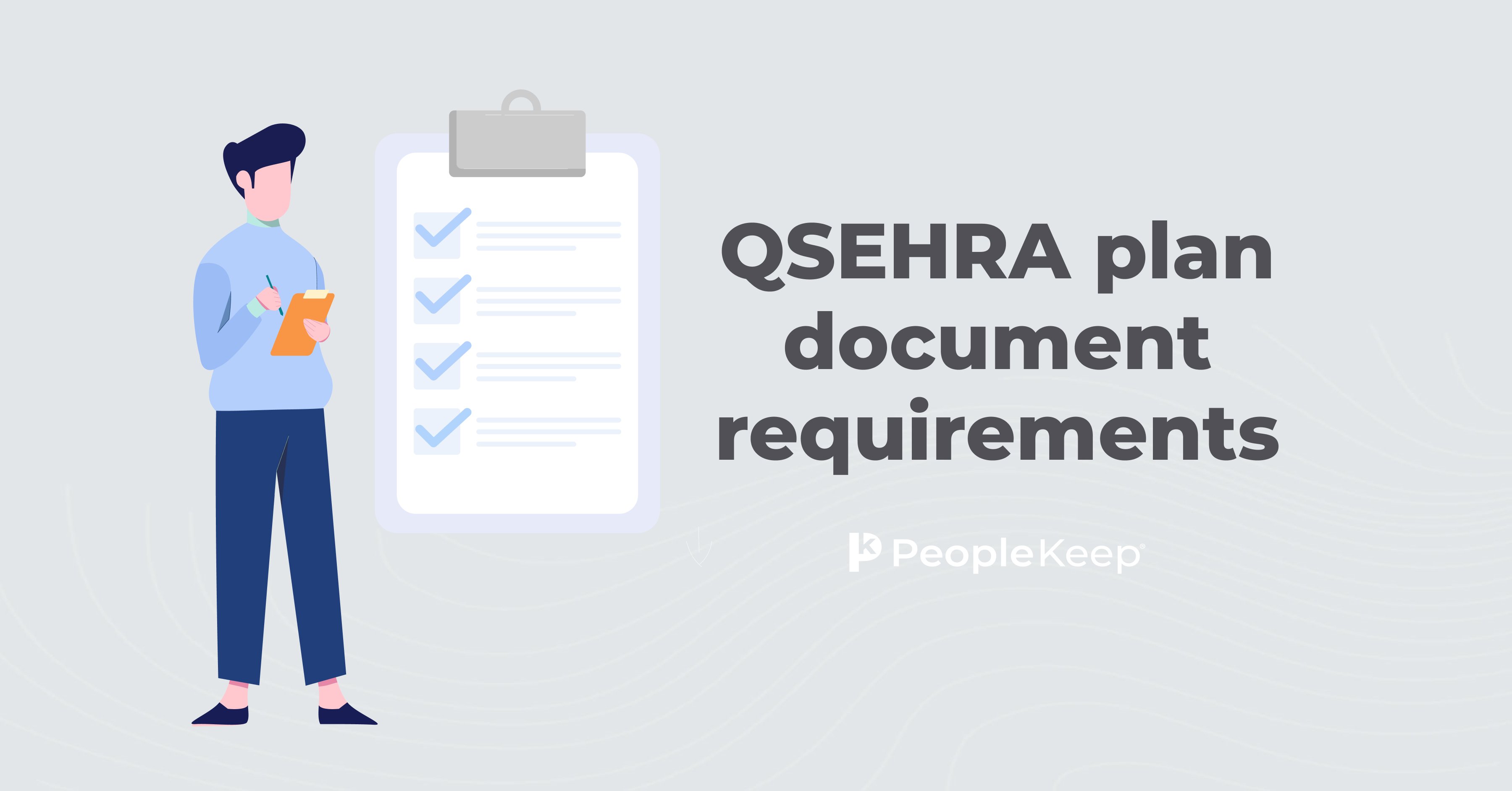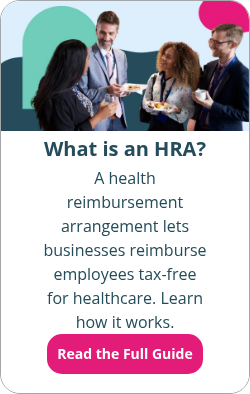HRA plan documents: What are the requirements?
By Holly Bengfort on January 6, 2026 at 8:00 AM
When considering health benefit options, many employers turn to health reimbursement arrangements (HRAs) as a cost-effective and flexible alternative to traditional group health insurance. HRAs enable employers to reimburse employees for individual health insurance coverage rather than purchasing the same group policy for all employees.
Like many employee benefit programs, HRAs come with specific requirements, such as plan documents, to ensure compliance. In this article, we’ll take a closer look at what HRA plan documents must include.
In this blog post, you'll learn:
- How HRAs allow employers to reimburse employees tax-free for eligible medical expenses, including individual health insurance premiums.
- HRA plan documents must include detailed information such as plan administrator, benefit descriptions, and eligibility criteria.
- How you can create and manage compliant HRA plan documents with PeopleKeep by Remodel Health.
What is an HRA?
A health reimbursement arrangement (HRA) is an IRS-approved, tax-free employee benefit plan. With an HRA, employers can reimburse employees for their eligible medical expenses. With a stand-alone HRA, this can include their individual health insurance premiums.
Here's a quick breakdown of how an HRA works:
- Employers decide how much tax-free money they want to offer to employees each month.
- Employees make healthcare purchases using their own money.
- Employees submit supporting documents, typically receipts, for their eligible medical expenses.
- Employers verify supporting documents and reimburse employees up to their set allowance amounts.
No matter your situation, there's an HRA to fit every organization's unique needs.
Two of the most popular stand-alone HRAs are:
- The individual coverage HRA (ICHRA): The ICHRA works for businesses of all sizes. Employees must have qualifying individual health insurance coverage to participate in the benefit. Employees can submit their monthly premiums and other qualifying medical expenses for reimbursement. There are no annual contribution limits with an ICHRA. Employers can also vary allowances by employee class, age, and family size.
- The qualified small employer HRA (QSEHRA): The QSEHRA is for small businesses and nonprofits with fewer than 50 full-time equivalent employees (FTEs). It provides tax-free reimbursement for all W-2 employees, whether they have an individual policy or coverage through a parent or spouse, as long as they have minimum essential coverage (MEC). There are annual contribution limits with a QSEHRA.
There are also two types of HRAs that pair with traditional group health insurance instead of reimbursing employees for individual health insurance premiums. These include the group coverage HRA (GCHRA) and the excepted benefit HRA (EBHRA).
What are the plan rules for an HRA?
The Internal Revenue Service (IRS) provides rules and guidelines for an HRA in IRS Notice 2002-451.
Under these rules:
- Only employers can contribute to an HRA. An employer can't fund it through employee salary deductions.
- An HRA may only reimburse employees during their effective dates in the HRA plan.
- An HRA can reimburse for eligible medical expenses and health insurance premium amounts, as defined in IRC Section 213(d).
- Each eligible medical expense requires substantiation.
- Employers generally exclude reimbursements from the employee's gross income under Internal Revenue Code Sections 106 and 105.
Additional rules for the QSEHRA are outlined by the 21st Century Cures Act, while the ICHRA is governed by the ICHRA final rules.
What are the plan requirements for an HRA?
To offer an HRA, your organization must adhere to the following regulations:
- IRS compliance: The IRS requires employers to set up a formal HRA to receive tax-free reimbursements.
- Federal compliance: A company must have measures and safeguards in place to meet HIPAA and ERISA regulations:
- Health Insurance Portability and Accountability Act of 1996 (HIPAA): The federal government generally considers HRAs as self-funded group health plans. These plans handle protected health information (PHI). Any entity processing HRA claims must follow HIPAA Privacy Rules2. Violating the privacy policy can result in significant financial and criminal penalties.
- Employee Retirement Income Security Act of 1974 (ERISA): The U.S. federal government has specific regulations that employers offering welfare plans must follow. One key requirement is a written plan document.
- Affordable Care Act (ACA): The ACA imposes additional requirements on HRAs, including how employers must present benefit information to employees, the necessary forms for reporting, and the design requirements for plans. The HRA plan must have the appropriate documents, data, and plan settings in place to be ACA-compliant.
What are the plan document requirements for an HRA?
Formal HRA plan documents should contain each of the following:
- Name of the HRA plan document administrator and the plan sponsor
- Designation of any named fiduciaries other than the HRA plan administrator under the claims procedure for deciding benefit appeals and their responsibilities
- A description of the HRA benefits provided
- Eligibility criteria (e.g., classes of employees and waiting periods for new hires)
- The effective date of participation (e.g., the next day or first of the month following satisfaction of the HRA eligibility waiting period)
- Amount the HRA participant must pay toward the cost of HRA coverage (typically $0, but some employers set up HRAs with deductibles for out-of-pocket expenses)
- HRA plan sponsor's amendment and termination rights and procedures, and what happens to HRA plan assets, if any, in the event of HRA plan termination
- Rules restricting and regulating the use of protected health information (PHI) if the plan sponsor receives PHI. You'll also need to name any HIPAA privacy officers
- Coordination of benefits provisions
- Procedures for allocating and designating administrative duties to an HRA third-party administrator (TPA) or committee
- How you fund the HRA plan
- Information regarding the Consolidated Omnibus Budget Reconciliation Act of 1985 (COBRA) if it applies to your organization, HIPAA, and other federal mandates
In addition to the formal plan document, HRAs must include written claims and appeals procedures that comply with ERISA requirements. This includes how participants submit reimbursement requests, what documentation they need to submit to substantiate medical expenses, timeframes for reviewing claims, and how participants may appeal denied claims. You’ll often include these in a written summary plan description (SPD).
Want to see tips specific to stand-alone HRAs like the QSEHRA or ICHRA? See our plan document articles below:
Where can I get HRA plan documents?
You can access plan documents from various online resources, software, or trusted advisors. Some small employers hire attorneys or use other legal services to create formal plan documents, which can be costly. Pre-written plan documents are also expensive, and once purchased, you can't easily modify them if your organization wants to change the benefit in a new benefit year.
Drafting HRA plan documents on your own can be risky. Under ERISA § 502(c)(1)3, plan administrators can face civil penalties if they fail to provide required plan documents when a participant requests them in writing. The law states that “each violation with respect to any single employee shall be treated as a separate violation.” The current adjusted penalty4 is up to $110 per day. These penalties don’t automatically apply in every scenario and are at the discretion of the courts and the Department of Labor.
If you want to avoid unnecessary costs and associated risks, you should utilize an HRA administration tool like PeopleKeep by Remodel Health. Our services include custom HRA plan documents, free plan amendments, and simple online benefits administration. Our team of experts will even review your employees' reimbursement requests and documentation so you can save time and avoid any HIPAA violations.
Conclusion
Health reimbursement arrangements (HRAs) are tax-free employee benefit plans that offer a cost-effective and flexible alternative to traditional group health insurance. Creating comprehensive HRA plan documents is necessary for employers to establish a clear framework for their health benefits and ensure compliance with applicable laws and regulations.
This blog post was originally published on December 3, 2018. It was last updated on January 6, 2026.
References
Check out more resources
See these related articles

HRA Plan Requirements
An overview of HRA Plan Requirements including HRA rules, HRA Plan Documents and setting up an HRA plan.

QSEHRA plan document requirements
In this post, we’ll discuss the requirements associated with QSEHRA plan documents and what information those documents should include.

Section 105 Plan Document Requirements
Section 105 Plan Document Requirements. What the Section 105 Plan Documents are required to include, and why you need plan documents for Section 105 Plans.




